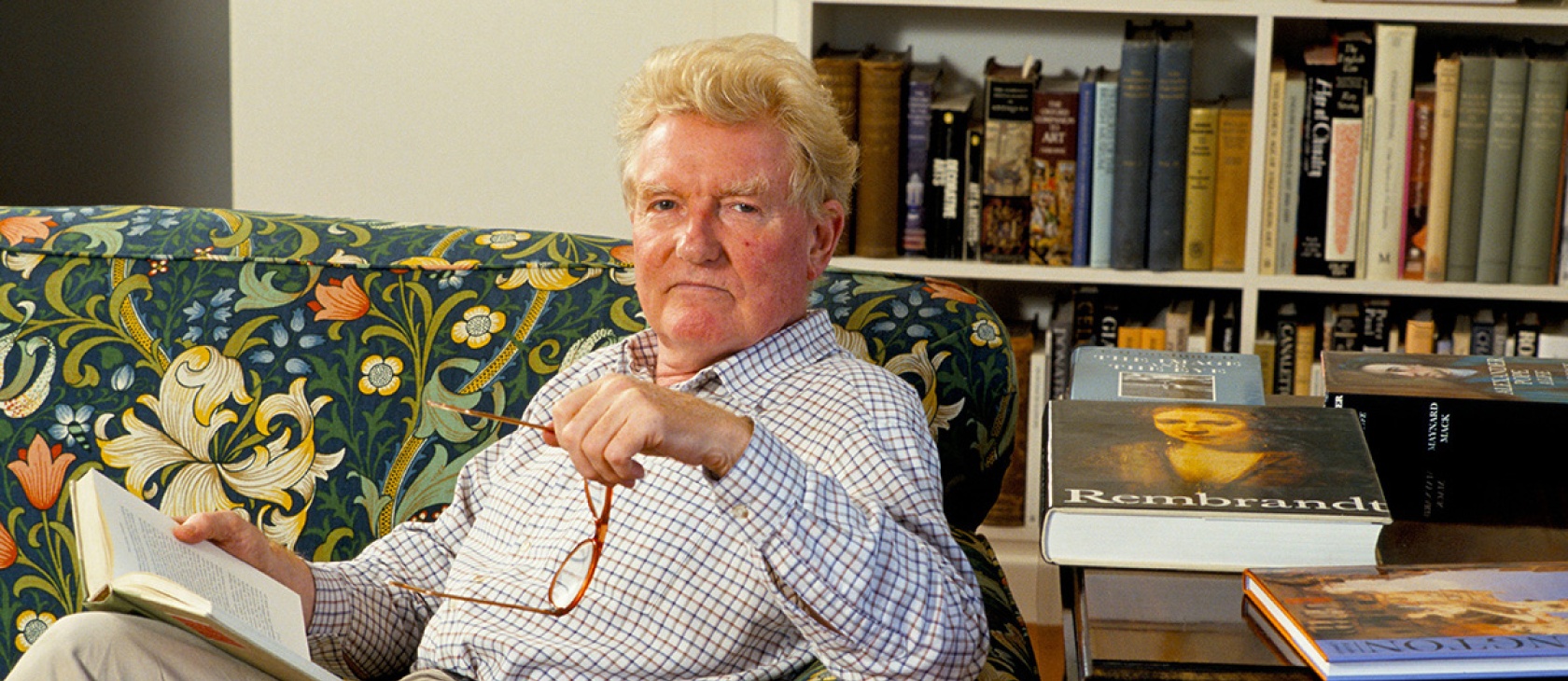On the 12th of January this year, British journalist and writer Paul Johnson died at the age of 94. Setting to the job of writing about him, it quickly started to seem as if 94 years were far too few to fit in everything he is reported to have said, done, and written. Wikipedia ominously offered up a “partial bibliography,” which includes dozens of books on every imaginable subject (including a 1,000-page history of the modern world).
Journalist and historian Paul Johnson followed the truth wherever it led him. And one truth that became crucial to his understanding of the world was that ideology was perilous to the human spirit.
But who needs a 1,000-page history of the modern world when you can just follow the biography of Paul Johnson? Like some kind of very high IQ Forrest Gump, he keeps popping up in the history books, in a series of confusingly varied roles. There he goes storming along the streets of the Midlands potteries; somewhere over the horizon stands a brilliant New Statesman editor, lecturing his colleagues; off goes a young officer to Gibraltar, confronting the evils of Franco; here he is meeting an admiring Richard Nixon; now advising Princess Diana—who is this man? Can it possibly be the same man?
The temptation, like a bad sportswriter falling back on calling soccer a “game of two halves,” is to chop his life into two acts. First, we have Paul Johnson the leftie, beloved in Latin America, compared to Eric Hobsbawm, crusading anti-establishment journalist, friend of Aneurin Bevan and enthusiastic Keynesian. Then follows his alienation from the increasingly militant Labour movement, his departure from the New Statesman, and embrace of Thatcher and Reagan. Johnson the “reactionary” is born, railing against modern relativism, a doughty Cold Warrior, defender of Pinochet and Jonathan Aitken, and conservative Catholic foe of liberation theology.
It’s certainly a more satisfying and digestible story, but sometimes complexity and contradiction better capture human nature than more straightforward storytelling. For Johnson the conservative was much in evidence decades before his supposed ’70s conversion––in 1964 you’ll find him sneering at the “glazed eyes” of Beatles fans and denouncing Ian Fleming’s Bond series as “schoolboy sex fantasies.” And well after the great shift rightward, he could be discovered throwing his support behind Tony Blair!
The scope and variety of his achievements and interests invites comparisons to one of those grand old Victorians like Gladstone or Disraeli, and perhaps the most Victorian aspect of his character, as reported by his son Daniel, was that he “rebelled violently against eminent Victorians and anything that smacked of restoration and reaction.” Behind the apparent ideological swerves was an extremely consistent liberalism in the classical sense, a love of freedom and a skepticism toward social engineering, whether justified in terms of romantic reaction or utopian socialism.
Here was a man who believed in progress as an artifact of individual human effort, genius, and character, a thing that could be lost more easily than it was won. His political allegiances seem confusing from the perspective of abstract political idealism but make a great deal of sense at a human level. Paul met politicians he liked, whom he saw something in, whom he resonated with, with whom he formed friendships, and endorsed their political projects on this basis. It was a habit that infuriated more ideological commentators but one that spoke to his own convictions, rather than a lack thereof. He denounced popular music (to the horror of left-wing commentators) because he didn’t want to see a “generation enslaved by a commercial machine” and believed in the vital role of the young as “the real leaders and creators of society tomorrow.” He cheered on the French students in ’68 (to the horror of right-wing commentators) because he respected young people willing to risk their lives to confront “the incompetence and complacency of all traditional political forces.”
Reading the aforementioned 1,000-page book—The Birth of the Modern: World Society 1815–1830—you’re immediately struck by its unabashed humanism. This is the sort of writing often dismissed as the “Great Man Theory of History.” Rather than treating human societies as masses driven by impersonal forces, we’re introduced to strong characters shaped by individual circumstance and providence. The book begins with an account of Andrew Jackson’s victory over an invading British force in 1812, crediting him with shaping world history forever.
Taking a leaf from his book, we might read Johnson himself as a participant in a decisive battle, one whose outcome, for good or ill, was determined by strong, flawed characters, not blind material forces. He backed Labour’s Barbara Castle against the union militancy that had ground British society to a halt, and when the battle was lost on the left, he took the side of Thatcher. Here, too, a certain Victorian spirit seems to shine through; a casualness about ideology, a fear of the capacity of civilization to fall into stasis and decay, and a pragmatic determination to keep society moving forward.
Today Britain finds itself in perhaps a still more serious crisis, caught between an increasingly dysfunctional state and a rapacious global market. The former is rocked by public sector strikes, a collapsing state monopoly on healthcare, a justice and policing system plagued by delay and under-resourcing such that criminals go free and crime unpunished, and a welfare state that seems to grow even as critical infrastructure is left unbuilt. The latter is evident in the jobs lost to aggressive global rivals like China; the corruption of a banking system that regularly funnels the money of dictators, oligarchs, and terrorists through the City of London; and the mass movement of cheap foreign labor into Britain at the behest of British companies in a race to the bottom that has seen British productivity stagnate for over a decade.
It’s a grim situation that cries out for intelligent responses—and strong leadership. Liberalism has become, not without some justice, a soiled brand in the context of these failures. The relentless push toward individualism and consumption, the denigration of traditions, the growing mistrust of shared institutions, and the failure of markets to deliver growth and prosperity for the many are all features of liberalism’s present crisis. Simply insisting that we go back to a prior liberal order or trusting in the impersonal forces of technological progress to rescue us are backward-looking counsels of inaction and despair. Against such follies, Paul Johnson’s life stands as a still lively and inspiring challenge, and a call for individual creativity and courage.
One would look with despair for a single programmatic ideology in his writings and ideas. But you discover something refreshing and vital if you look instead for the human factor. Paul Johnson was most of all a Catholic, one in the mold of Lord Acton, with the ability to engage equally both fellow Catholics and Protestant Englishmen. The product of a Jesuit education that he much preferred to his time in Oxford, we find in his works a love of ordered liberty married to a fierce nonconformism, a Newman-like sense of conscience and individual reason as something sacred and inviolable. The state of modern Britain reflects as much a human failure as an ideological one, and perhaps the damning thing you could say about it is that Paul Johnson’s career would be impossible today. We have become censorious, prim, and puritanical, but at the same time unserious, cynical, and mocking. We’ve never needed writers like Johnson more, and we’ve never deserved them less.
This essay is taken from the “In the Liberal Tradition” column of the Summer 2023 issue of








